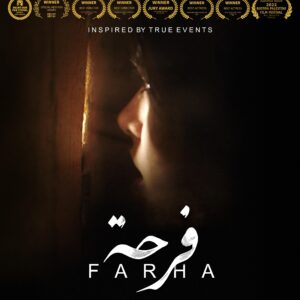In the year following the UN resolution partitioning Palestine into two states and the end of the British Mandate, rising violence between Jewish settler militias and the local Palestinians escalated into a full-blown war. Violence by Zionist militias and the newly-established Israeli army forced hundreds of thousands of Palestinians to flee from their homes before the outbreak of war with neighboring Arab states.
This film tells the story of the titular character Farha (Karam Taher), as we see through her eyes her expulsion from her village by these militias and the struggles she faces trying to survive, allowing us to experience the growing anxiety expressed by the characters as the outbreak of war slowly approaches.. Farha is depicted as a strong-willed and bookish young woman who dreams of attending school in the city while most girls in her village look forward to marriage and accept the traditional roles.
The story displays beautiful representations of Palestinian culture and traditions through the characters’ costume designs, folk songs, and cultural celebrations, but does not shy away from the conservative societal norms that Farha vehemently opposes She refuses to be married off and demands that her father Abu Farha (Ashraf Barhom), the mayor of the village, enroll her in school, which he is hesitant about as he worries over finding a suitor to take care of her as the dangers of the conflict grow.
Despite the societal pressures, Farha hopes to move to the city to study with her best friend Farida (Tala Gammoh), become a teacher, and open up a school just for girls. Before these are able to be born out, tragedy strikes the village and changes not only their lives, but also the society as they know it.
Militias attack Farha’s village, forcing everyone to escape with what little they can carry. Farha’s father decides to stay behind to support the local Palestinian militias and entrusts Farida’s father (Firas Taybeh) to take Farha to safety, but Farha refuses to leave and joins her father. Farha’s father locks her away in a storage room and tells her to wait as he goes to join the resistance, reassuring her that he will come back. As Farha hides away, we experience her claustrophobia, dread, and anxiety about the horrors she hears outside, confronted with the struggle of survival and uncertainty of the future.
The film is the debut feature of director and screenwriter Darin J. Sallam, who told Time Magazine that her depiction of this time period comes from the oral histories of firsthand accounts passed down through Palestinian families, as well as extensive research like historian Ilan Pappe’s The Ethnic Cleansing of Palestine.
The film was met with backlash and a smear campaign from Israeli officials, who denounced the story as a false narrative and pressured Netflix to remove it from the platform. It was nominated for seven different awards, taking home three from the Red Sea International Film Festival, the Malmö Arab Film Festival, and the Asia Pacific Screen Awards.
Sallam reveals that the story of Farha is based on a real girl who lived during the Nakba named Radieh, who lived in Palestine and was locked in a room by her father to protect her from Israel’s invasion at that time. Radieh’s story was passed on to Sallam from her mother and grandmother. Sallam expressed how she related to Radieh’s story, as she grew up listening to similar stories from the Nakba from families and friends, all of which inspired the character of Farha, a name that translates to “joy.” Sallam explains that she chose the name “because of how they talked about their life before the Nakba—to me it was life before their joy was stolen.”
Discussion Questions:
- What symbolism do you see in Farha’s confinement in the storage room and how can it be related to larger societal pressures?
- What do you think about the backlash the film received from Israeli officials attempting to delegitimize the film’s message? How is it indicative of the struggle for Palestinian creatives to tell their story?
- From the limiting viewpoint of the film to Farha’s perspective, especially when she is hiding, in what ways does this represent the restrictions in showing the history of the Nakba?


